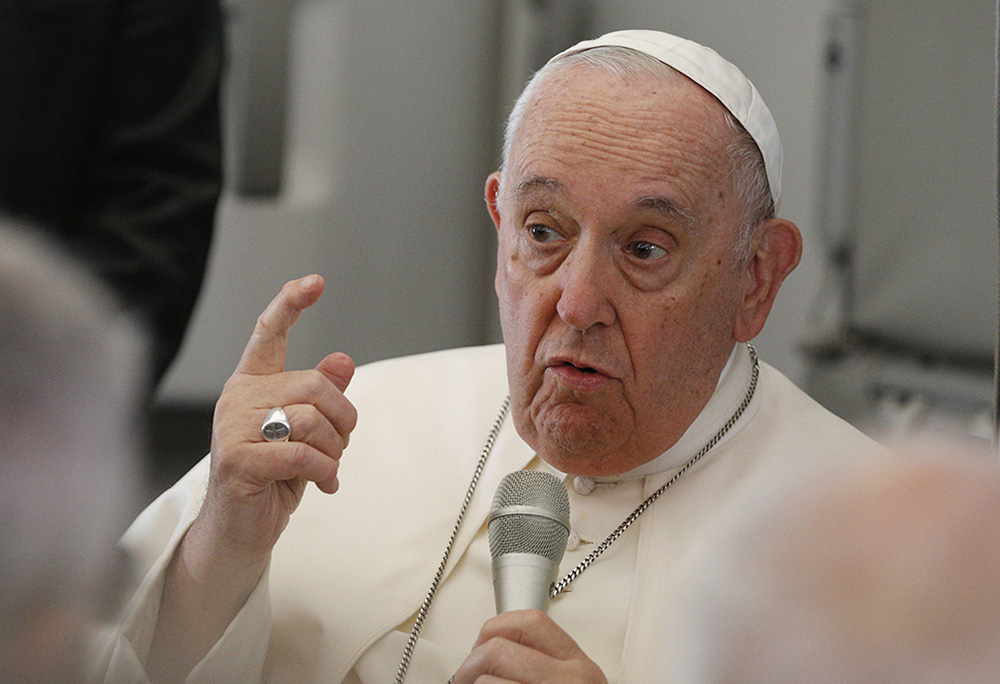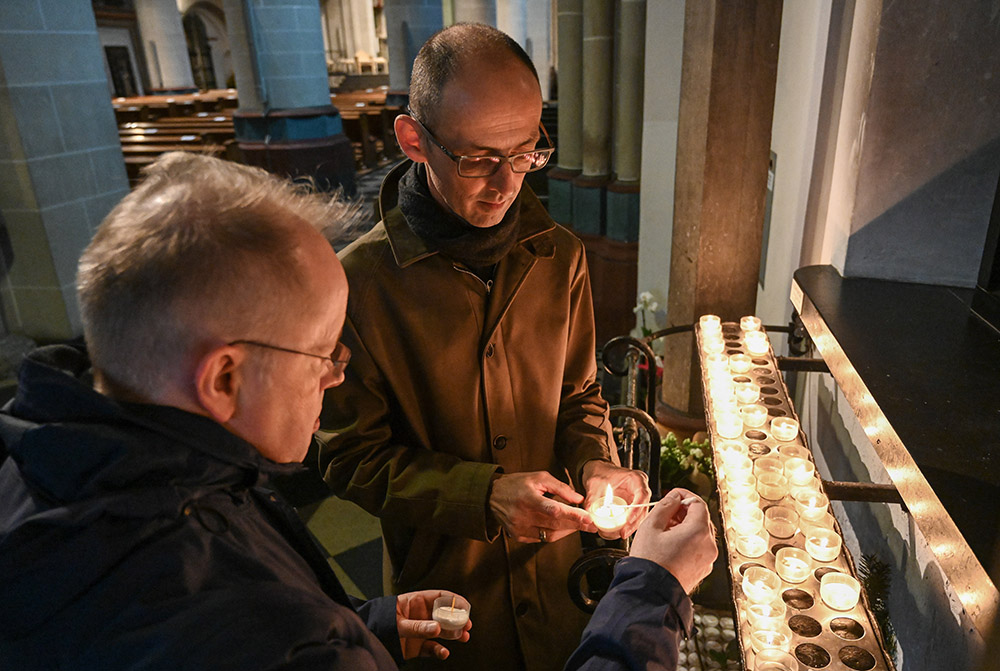
Pope Francis answers questions from journalists aboard the flight from Juba, South Sudan, to Rome Feb. 5. (CNS/Paul Haring)
In an interview with the Associated Press 10 days before his African trip, Pope Francis made his first public remarks about decriminalizing homosexuality. Social discrimination and violence toward LGBTQ people are widespread in Africa, Asia and some former Soviet bloc countries, such as Russia and Poland. In 67 nations in the world, people can be imprisoned or even executed for same-sex activity.
Because violence toward LGBTQ people is often associated with religious condemnation of homosexuality, advocates have been calling on the pope for years to make such a statement. His words were warmly welcomed.
In that interview, the pope said that there needed to be a distinction between a crime and a sin. "It's not a crime. Yes, but it's a sin." In addition to distinguishing between a sin and a crime, he noted, "It's also a sin to lack charity with one another."
He said homosexuality was part of the "human condition" and "we are all children of God, and God wants us as we are and with the strength that each of us fights for our dignity."
But the pope's statement, "It's a sin," made me and some of my colleagues think about the ambiguity of using pronouns. "It," as Francis was using the pronoun, obviously referred to homosexual acts, which official church teaching judges to be immoral. But many people, including many Catholic leaders and people in nations where LGBTQ people are criminalized, believe that "it" refers to simply being homosexual. Catholic teaching does not consider being homosexual to be a sin.
Advertisement
However, while the Catechism of the Catholic Church says that homosexuals "must be accepted with respect, compassion, and sensitivity," it brands the orientation as "objectively disordered." The word "disordered" can be demeaning. In common English, it usually refers to psychological problems when applied to people. Furthermore, the word can promote self-hatred if people think of themselves as "disordered."
It is little wonder that lesbian and gay persons feel rejected by the church when such language is used. Too often, they feel that to maintain their integrity they must leave the church.
Along with many other Catholics, including bishops, I believe that the "disorder" language must be removed from the catechism and official church teaching.
While some will say the church can never change its teaching, including its sexual teaching, that idea is simply wrong. In 2017, at a celebration of the 25th anniversary of the publication of the catechism, Francis said, "Doctrine cannot be preserved without allowing it to develop, nor can it be tied to an interpretation that is rigid and immutable without demeaning the working of the Holy Spirit."
It is precisely such a development of doctrine that LGBTQ Catholics and their allies have been calling for. They do not want a "rigid and immutable" interpretation of sexual ethics that would be "demeaning to the working of the Holy Spirit" in their own lives and in the life of the church.
Theological development
The church's teaching on sexual ethics, as in many areas, has changed over the centuries. Since the Second Vatican Council, many moral theologians have critiqued the teaching on sexual ethics. Unfortunately, theologians were silenced and debate was suppressed during the previous two papacies.
As Jesuit Fr. Thomas Reese noted after the death of Pope Emeritus Benedict XVI, "The creative rethinking of church teaching begun at Vatican II was squashed. Rather than finding new ways to explain the faith to people in the 21st century, the church repeated formulas many found meaningless."
We now have a pope who wants to listen to the church. Since Francis was elected, the Vatican has not silenced any theologians. He does not fear the sensus fidelium of the people of God.
LGBTQ people and serious-thinking Catholics are increasingly ignoring the church's teaching about homosexuality and gender. These Catholics believe that morality grounded on obsolete knowledge is flawed.
On the contrary, Francis has called a worldwide synod to invite the people of God to listen and dialogue about communion, participation and mission in the life of the church. After honest sharing and patient listening in the world's Catholic dioceses, LGBTQ issues, and other topics about sexuality and gender, have emerged as leading themes in the continental stage of the synod.
The past 50 years have witnessed an immense growth in the understanding of sexuality and gender. So much new research and information is now known by experts in medical, psychological, sociological and theological fields. This new knowledge is much more trustworthy than in previous decades because it has been done without cultural and societal biases against LGBTQ people, and, more importantly because LGBTQ people have been consulted about their lived experiences.
With each passing decade, Catholics have become more comfortable in accepting LGBTQ people. More than three-quarters of U.S. Catholics support their human and civil rights and more than half approve of same-sex civil unions. This social acceptance is similar among Catholics in large parts of the Western world.
For example, The Tablet, a leading Catholic periodical in England, recently editorialized that doctrine about homosexuality is "A Church teaching with shaky foundations." The editorial observed that, by describing homosexual activity as unnatural, LGBTQ people are in the same category as married heterosexual couples who use artificial means of birth control, because artificial contraception is also considered unnatural. Nearly 90% of U.S. Catholics ignore or reject the teaching on contraception, but have not left the church.
Similarly, LGBTQ people and serious-thinking Catholics are increasingly ignoring the church's teaching about homosexuality and gender. These Catholics believe that morality grounded on obsolete knowledge is flawed, whether the morality is applied to heterosexual, homosexual or transgender people.

A gay couple lights votive candles at a Catholic church in Essen, Germany, Oct. 30, 2021. (CNS/KNA/Harald Oppitz)
During the 2015 synod on the family in Rome, many bishops also desired to see an approach to homosexuality that was based on current science. They objected to the language that described homosexuality as an "objective disorder" and an "intrinsic moral evil," saying that these words were pastorally harmful and needed to be revised.
Since that time, and particularly during the Synodal Way in Germany, a whole host of European cardinals and bishops are calling for a reassessment of the church's sexual ethics. In the U.S., Cardinal Robert McElroy recently called for the language of "intrinsically disordered" to be removed from the catechism.
For a more authentic approach to homosexuality, the official teaching needs to build on the language of the 1975 Vatican document Persona Humana, which recognized that some lesbian and gay persons "are definitively such because of some kind of innate instinct." This "innate instinct" would imply that same-sex feelings are quite natural for some people.
In the meantime
Church teaching on sexuality will inevitably change but, as in the past, this change will not come quickly enough for some or without great angst for others. Witness Africa. The pope's trip made it abundantly evident that LGBTQ issues are a source of controversy on that continent.
On the plane returning from his six-day trip to the Democratic Republic of Congo and South Sudan, Pope Francis again asserted that homosexuality should not be criminalized.
There needs to be a chorus of voices around the world, rejecting the callous and inhumane language that has wounded innumerable LGBTQ people.
"This is not right," he said. "People with homosexual tendencies are children of God, God loves them, God accompanies them. ... To condemn such people is a sin; to criminalize people with homosexual tendencies is an injustice. ... The Catechism of the Catholic Church says they should not be marginalized. This point, I believe, is clear."
But as The New York Times reported, the mere mention of lesbian or gay people prompted immediate condemnation from some Africans. Some Catholics there said that homosexuality was a sin and therefore a crime or that "it didn't exist."
Archbishop Stephen Ameyu Martin Mulla of Juba, South Sudan's capital, argued that "the issue of homosexuality was not a priority." He said he was not aware of anyone being imprisoned for homosexuality and felt that each country should be allowed to address the subject as it chooses.
Francis, leader of a church of 1.3 billion members, must accompany his people on the path of synodality. The logo used in portraying synodality says it all: the people of God walking together.
But in the meantime, until we are walking together, those who see the necessity of change must follow their consciences. They need to speak their convictions, loud and clear and often. There needs to be a chorus of voices around the world, rejecting the callous and inhumane language that has wounded innumerable LGBTQ people, fostered their degradation and provoked unspeakable violence against them.
We cannot afford to be silent. Millions of LGBTQ lives are at stake.








